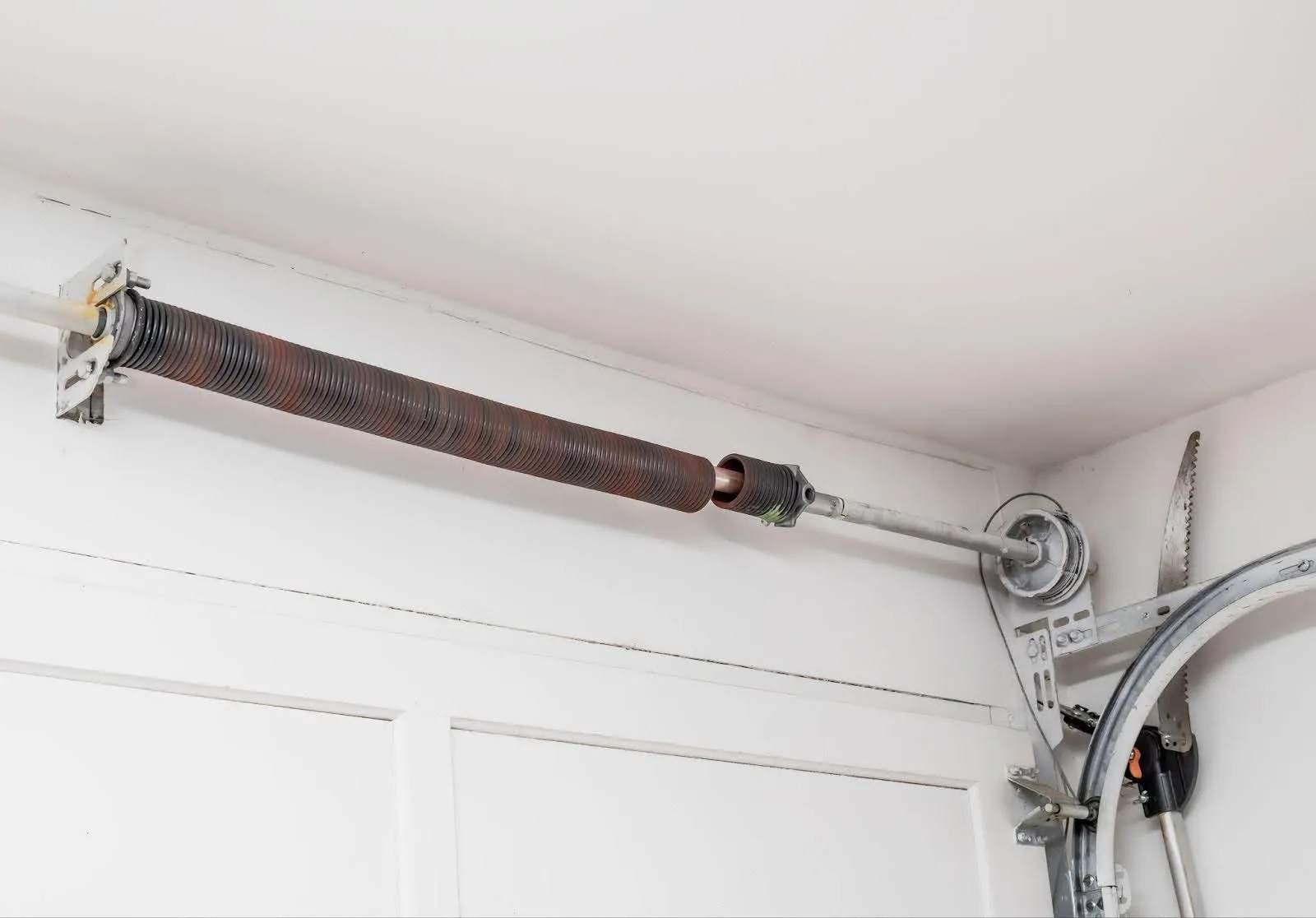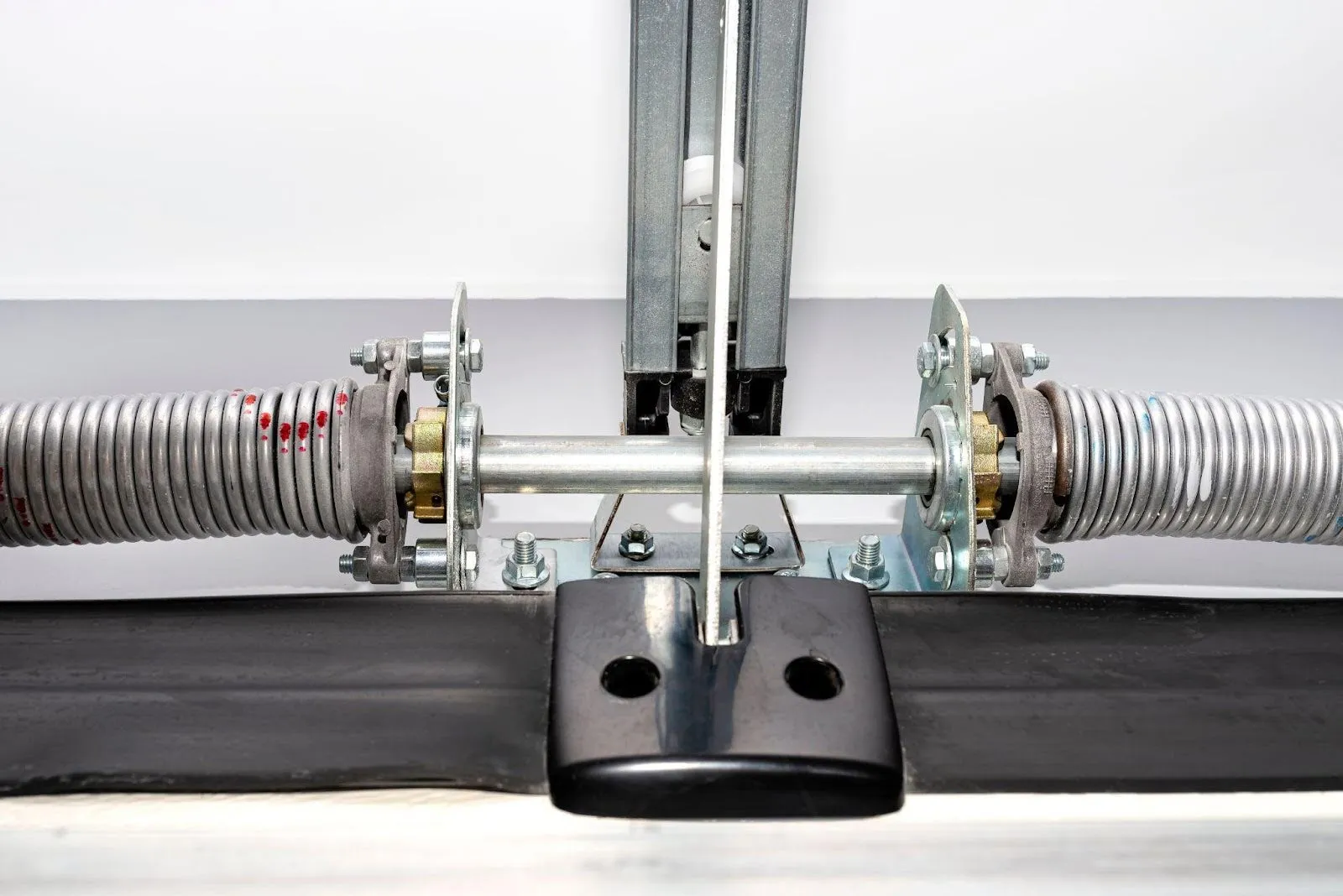Garage door springs keep your door operating smoothly. These springs support the door’s weight, providing the tension and balance needed to open and close it easily. When the door lifts, springs counterbalance the weight, making it easy for the opener to operate; when the door lowers, they help control its descent.
In this blog, we’ll explain the differences between extension and torsion springs, including how they work, where they’re typically installed, and the pros and cons of each. With a clear understanding, you can make the best choice for your garage door, improving its safety, longevity, and performance.
Extension springs
Extension springs provide a common solution for supporting a garage door’s weight by stretching as the door opens and closes. These springs stretch along their length to absorb and release energy, helping to lift the door with less strain on the opener. You’ll typically find extension springs installed on each side of the door, running parallel to the tracks.
How extension springs work
When you open the garage door, extension springs stretch, storing energy that lifts the door and eases the load on the opener. As the door closes, the springs gradually release this energy, allowing the door to lower smoothly. Extension springs work well in residential settings with lighter, standard-sized garage doors.
Pros and cons of extension springs
Pros
- Affordable: Extension springs tend to cost less than other types, making them popular for budget-conscious homeowners.
- Widely used: Extension springs are easy to find and widely available, making them a common choice for many homes.
- Easy to install: Extension springs require a straightforward installation process, making them appealing for DIYers.
Cons
- Less durable: Extension springs generally have a shorter lifespan, especially with heavy use, compared to torsion springs.
- Higher risk of snapping: These springs carry high tension and can snap suddenly if they wear down, posing safety risks.
- Frequent maintenance: Extension springs need more regular maintenance checks and adjustments to ensure safe, effective performance.
Extension springs offer an affordable and accessible solution for many homeowners, though they may need more maintenance and don’t last as long as torsion springs. For homes with lighter doors or low-traffic garages, extension springs serve as a practical option, but it’s essential to stay mindful of their maintenance needs and potential safety risks.
Torsion springs
Torsion springs are a durable, high-performance type of spring commonly used in garage doors to support and balance their weight. Unlike extension springs, torsion springs twist instead of stretch, storing energy through tension as they coil tightly. You’ll typically find torsion springs mounted above the garage door on a metal shaft.
How torsion springs work
When you open the garage door, the torsion springs twist to release stored energy, helping to lift the door smoothly and evenly. As the door closes, the springs wind up, storing energy once more to control the descent. This twisting motion offers controlled, balanced movement, which reduces wear on the opener and makes torsion springs ideal for heavier, high-traffic doors.
Pros and cons of torsion springs
Pros
- Durability: Torsion springs last longer than extension springs, handling frequent use and heavier doors with ease.
- Smooth operation: The balanced, controlled movement of torsion springs ensures a smoother, quieter operation, reducing strain on the opener.
- Increased safety: Torsion springs are less likely to snap suddenly, which lowers safety risks and makes them a safer choice in busy households.
Cons
- Higher upfront cost: Torsion springs typically cost more initially, though their durability can save on long-term maintenance and replacement expenses.
- Professional installation required: Due to their high tension and complexity, torsion springs need professional installation to ensure proper alignment and safety.
For homeowners seeking durability and reliable performance, torsion springs provide a smart investment, especially for larger or frequently used garage doors. Their smooth operation, safety, and longevity make them a top choice, although they do come with a higher upfront cost and the need for professional installation. With torsion springs, you get lasting quality and a more stable garage door system.
Key differences and choosing the best garage door springs for your needs
Choosing between extension and torsion springs for your garage door depends on your budget, usage, and priorities. Each spring type has distinct features, with extension springs stretching along the sides of the tracks to counterbalance the door’s weight and torsion springs twisting above the door to provide a controlled, balanced lift.
Location and durability
Extension springs mount on the sides of the door, which works well for lighter residential setups. However, they require more frequent maintenance and tend to wear out faster. Torsion springs, mounted above the door, handle heavier, high-traffic doors more efficiently and distribute energy evenly, making them longer-lasting.
Cost considerations
Extension springs generally cost less upfront, which appeals to budget-conscious homeowners, but their shorter lifespan and maintenance needs can lead to higher long-term expenses. Torsion springs, though more expensive initially, save on repair and replacement costs over time due to their durability.
Safety and use frequency
Torsion springs offer better safety, especially in households with children or pets, since they’re less prone to snapping. If you use your garage door frequently, torsion springs provide smoother, more reliable operation. Extension springs can work well for occasional use, but they carry higher tension and can snap, so adding safety cables is recommended.
If you prioritize longevity, smooth operation, and long-term savings, torsion springs make an excellent investment. However, if you’re looking for a more budget-friendly option for occasional use, extension springs are a reliable choice. Assess your budget, usage, safety needs, and maintenance preferences to choose the spring type that best suits your garage door’s requirements.

Why professional installation matters
Professional installation ensures that your garage door springs operate safely and effectively, no matter the type. Both extension and torsion springs handle high tension and need precise setup to manage the weight and movement of the garage door. Choosing a professional installer provides several important advantages.
Ensure safety with high-tension springs
Installing springs on your own carries serious risks, especially with torsion springs, which store immense tension. A slight miscalculation or lack of proper tools could lead to serious injury if a spring releases unexpectedly. Professionals use specialized equipment and proven techniques to handle high-tension springs safely, protecting both you and your property.
Achieve precise installation and alignment
Precise alignment is essential for smooth operation. Professionals calibrate the springs to balance the door evenly, which reduces strain on the opener and prevents uneven wear.
Without proper alignment, springs may fail prematurely, and the door may become difficult to open or close. A professional installer sets up springs to ensure flawless movement and maximum durability.
Avoid costly mistakes
DIY installation often leads to costly errors. Improperly installed springs can damage the opener, misalign the tracks, or cause erratic door operation. Hiring a professional saves you from these extra repair costs and ensures your system runs smoothly from the start.
Professional installation isn’t merely a convenience; it’s an investment in the safety, efficiency, and longevity of your garage door. Professionals bring the expertise needed to install springs correctly, allowing you to enjoy a worry-free, dependable garage door for years.
A-1 Garage Door Repair
Choosing the right garage door springs and ensuring professional installation makes all the difference in safety, performance, and long-term value. For expert guidance and reliable service, trust A-1 Garage Door Repair. Our experienced team handles both extension and torsion spring installations with precision, ensuring your garage door operates smoothly and securely.
Contact A-1 Garage Door Repair today for professional assistance and peace of mind.

